First and foremost, Betsy Parsons is an educator. She taught in Portland public schools for 30 years and still shows the kind of zeal for literature that an English teacher has.
In the 1990s, when lesbian, gay, bisexual and transgender students in Parsons’ classes refused to come to school to face another day of bullying, were compelled to switch schools or, in too many cases, lost hope and took their own lives, she saw those tragedies through the lens of a teacher: These children, with all their potential, were being deprived of their right to an education.
“If you want to know what’s at the core of my teacher self, it is my passion about the right of every child to learn in respect and safety,” Parsons said.
In response, she started building support structures. In 1996, she helped found the southern Maine chapter of the Gay Lesbian and Straight Education Network, or GLSEN, an advocacy group aimed at making schools safe for students, regardless of sexual orientation or gender identity.
She also realized that in order to change the culture in her school, she had to come out as gay herself. It was a radical act in 1998, the year Maine became the first state in the country to repeal its law protecting gays and lesbians from discrimination. But Parsons knew her students needed to know they were not alone.
One day as they discussed Nathaniel Hawthorne’s “The Scarlet Letter,” an opportunity presented itself. As they talked about the townspeople stigmatizing the book’s protagonist, Hester Prynne, one student cried out, “This is what a lot of people do to gay people!”
“That gave me the window to say, ‘Well I know something about that,’ ” Parsons recalled. ” ‘I’m a lesbian teacher.’ That changed a lot of things.”
By the end of the day, word had spread and 20 students stood sheepishly in the hall, waiting to approach her. They asked if she would help them start a gay-straight alliance at Deering High School.
It was only the third such alliance in the state but the impact was undeniable. A 2014 Canadian study found that gay-straight alliances decrease homophobic discrimination in schools and suicidal thoughts and actions among LGBT students. Students are more likely to graduate from high school and seek out higher education.
Plus, students don’t need to be in the clubs or be gay to benefit: The same study found that in schools that have had gay-straight alliances for three years or more, heterosexual boys were half as likely to attempt suicide.
When Parsons saw the haven the alliance provided, she made it a mission to support the groups, now referred to as gay-straight-transgender alliances, or GSTAs, across the state. She advised faculty and students on starting their own alliances and created a hub at GLSEN for the state’s alliances. She held monthly meetings for student leaders, trained them in public speaking and helped them advocate before school boards and the state Legislature.
Skyler J. Keiter, 20, a former member of GLSEN’s alliance student leadership team, had helped lobby senators and representatives to defeat a religious freedom bill, which opponents feared would open the door to discrimination. “It was extremely empowering and especially at a time in my life where things weren’t necessarily easy for me,” Keiter said of the experience.
Parsons has been tireless in her work with students, and even as they move on to adulthood, they continue to call her for advice and for solace.
“She is a living example of how to be good to fellow people,” said Sianna Niedzolkowski, 20, a former alliance leader. “Greet every problem with loving kindness, speak the truth even if your voice shakes, and always stand firm in your identity.”
Copy the Story LinkComments are not available on this story.
Send questions/comments to the editors.



